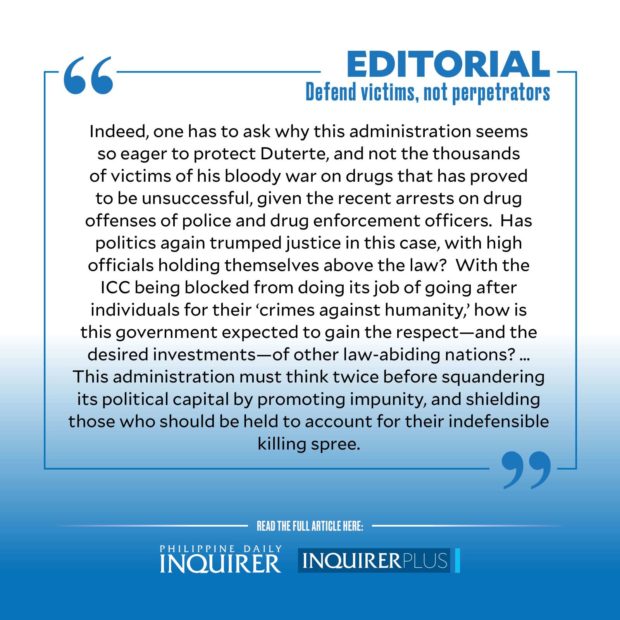Defend victims, not perpetrators
The International Criminal Court (ICC) last week reopened its inquiry on the Duterte drug war after pausing it in November 2021, on Manila’s assurance that it was reexamining hundreds of cases of deadly drug operations involving the police and government agents.
With the previous administration admitting to over 6,000 killings in violent drug raids, government officials are now in a mad scramble to block the ICC probe. The Hague-based tribunal, which is considered a “court of last resort,” steps in and exercises jurisdiction if countries are unwilling or unable to prosecute offenders, with an inquiry that the Philippine government has consistently rejected as unnecessary and without jurisdiction.
Article continues after this advertisementThe Philippine National Police and Justice Secretary Jesus Crispin Remulla have contended that the global body has no jurisdiction over the country since former president Rodrigo Duterte withdrew the Philippines’ ICC membership in 2019, following the tribunal’s launch of a formal examination on the killings in 2018. The Rome Statute, which created the ICC, however allows it to investigate crimes committed during the period of the country’s membership.
Remulla’s claim is echoed by President Marcos Jr.’s legal adviser Juan Ponce Enrile. “If they will come here … I will cause their arrest. They interfere too much in our internal affairs,” Enrile said, adding that Duterte did not violate the law when he ordered a crackdown against drug peddlers and users. “He is acting under the country’s Constitution to enforce the law. That is his oath,” said the defense secretary during the martial law era, without specifying which law allows the killing of suspects without due process.
In its investigation of hundreds of drug-related killings, Duterte’s Justice Secretary Menardo Guevarra, now the solicitor general, acknowledged the major failings of government operatives that tended to show how the drug raids were more of summary executions than the shootouts that the police had claimed. Out of 52 reexamined cases submitted for prosecution by the justice department, only two have resulted in the conviction of police officers involved, leading the ICC’s Pre-Trial Chamber to conclude that the “domestic proceedings in the Philippines do not sufficiently mirror the expected scope of the Court’s investigation, since they only address the physical, low-ranking perpetrators, and at present do not extend to any high-ranking officials.”
Article continues after this advertisementSuch pronouncement blatantly belies Remulla’s and Guverra’s insistence that the country’s justice system is working. Remulla, whose son was recently acquitted of drug possession charges in a record-setting 79 days, would be just as hard pressed to prove that “swift justice” applies to all, with former senator Leila De Lima’s six-year detention and delayed trial more like the norm in our labyrinthine legal system.
The justice secretary has also challenged the ICC to show proof of government culpability in its probe. But why the defensive stance? Shouldn’t government officials be the first to adhere to the Duterte administration’s blanket rationale on illegal raids and the preemptive character of the anti-terrorism law, which is: “Why be afraid when you have nothing to hide?”
As for Duterte supporters maintaining that the former president should be tried by local courts, the recantation of the prosecution witnesses against De Lima on grounds of coercion should provide ample proof of how compromised our justice system has become, with poor litigants and the drug victims’ families fearing for their safety if they testify against figures of authority.
Instead of blocking the ICC, minority lawmakers have urged the Marcos Jr. administration to return to the tribunal, as “it is imperative that those responsible for these crimes [be] held accountable for their actions,” ACT Teachers party list Rep. France Castro pointed out. Sen. Risa Hontiveros meanwhile noted that with the country’s “increased international participation … it [is] only appropriate for the Philippine government to rejoin [the Rome Statute] as a state party,” a call that led Senate Minority Leader Aquilino Pimentel III to warn of “reputational damage” should the country refuse to participate in the ICC probe.
Indeed, one has to ask why this administration seems so eager to protect Duterte, and not the thousands of victims of his bloody war on drugs that has proved to be unsuccessful, given the recent arrests on drug offenses of police and drug enforcement officers. Has politics again trumped justice in this case, with high officials holding themselves above the law? With the ICC being blocked from doing its job of going after individuals for their “crimes against humanity,” how is this government expected to gain the respect—and the desired investments—of other law-abiding nations? Are all those travels abroad for nought? This administration must think twice before squandering its political capital by promoting impunity, and shielding those who should be held to account for their indefensible killing spree.

















